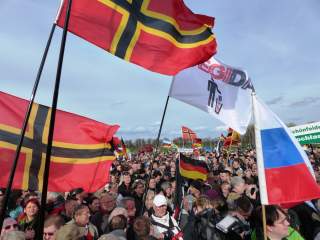Germany's Right-Wing Crusaders
There’s more than meets the eye to the upstart Alternative für Deutschland—and it’s not going away.
THE GERMAN debate over the refugee crisis of 2015 has cut through families and friendships across the land, and precipitated a series of feuilleton debates not seen in the country since the Historikerstreit of the 1990s. Unlike the debate about that German past, which the liberals handily won, they seem poised to lose the current one. In the pages of Cicero magazine, the philosopher Peter Sloterdijk upset liberal sensitivities when he used the language of Carl Schmitt to argue that in today’s Germany it is the refugee, rather than the state, who takes the “decision” by crossing the nation’s borders. Though hardly a comprehensive defender of Merkel’s policies, the chancellor’s most articulate explainer is the political scientist Herfried Münkler, who argues that Merkel did not have much of a choice on the refugee question: she could either pretend to control the situation by granting them entry, or lose control of it by declaring a state of emergency. (This reading has been recently been substantiated by Die Welt journalist Robin Alexander’s insider account of Merkel’s decision to open the border.) Münkler criticizes Merkel for not using her diplomatic skills to get eastern European neighbors to share the burden, which she had often been able to do in the past. The only point to add is that Merkel, ever vigilant of the barometers of popular opinion, was in fact late to the party of pro-refugee sentiment across Germany when she opened the border to refugees in 2015. Her problem was more one of timing in relation to German public opinion. By the time she had embraced her open-door policy, the public enthusiasm had waned, and she shifted her policies rightward accordingly. New restrictions against asylum seekers were put in place, a burqa ban was coyly entertained, and Erdogan was handsomely paid off to the point that other bouncers at Europe’s gates demanded their own bonuses. Facing nationalist pressure from without and within—and what seems increasingly like a mosquito-sized threat in the form of Martin Schultz, the Social Democrat candidate who buzzes a few centimeters to her left—Merkel appears ready to give room on the question of Islam and the question of refugees, but she is likely to stand firm against any necessary reform of the euro, unlikely to be seduced by the “Mozart of Finance.” The numbers for 2016 have come in. At 6.6 million euros, Berlin’s budget surplus has exceeded even the most optimistic expectations. It is a political economic arrangement better left unmentioned by politicians across the land: bad years for Europe are now good years for Germany.
Thomas Meaney is the fellow in residence at the Einstein Forum in Potsdam. He has reported from Germany for the London Review of Books, the Guardian and the New Yorker.
This essay was published in the July/August 2017 print magazine under the headline “Teutonic Tremors.”
Image: PEGIDA rally in Dresden. Wikimedia Commons/Creative Commons/Metropolico.org

